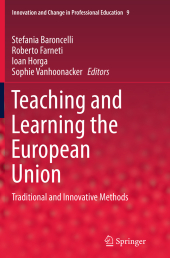 Neuerscheinungen 2016Stand: 2020-02-01 |
Schnellsuche
ISBN/Stichwort/Autor
|
Herderstraße 10
10625 Berlin
Tel.: 030 315 714 16
Fax 030 315 714 14
info@buchspektrum.de |

Stefania Baroncelli, Roberto Farneti, Ioan Horga, Sophie Vanhoonacker
(Beteiligte)
Teaching and Learning the European Union
Traditional and Innovative Methods
Herausgegeben von Baroncelli, Stefania; Farneti, Roberto; Horga, Ioan; Vanhoonacker, Sophie
Softcover reprint of the original 1st ed. 2014. 2016. viii, 248 S. 2 SW-Abb., 12 Farbabb. 235 mm
Verlag/Jahr: SPRINGER NETHERLANDS; SPRINGER 2016
ISBN: 9401778744 (9401778744)
Neue ISBN: 978-9401778749 (9789401778749)
Preis und Lieferzeit: Bitte klicken
Based on a survey of some 2000 European Studies courses, this book maps and analyses teaching methodologies, and offers case studies on simulation games, e-learning, problem based learning, blended learning, and learning through the use of social networks.
This volume examines the EU´s changing educational context and its challenges. Based on an extensive survey of more than 2000 European Studies courses in 30 European countries, it maps and analyses the features of teaching methodologies as they emerge from both disciplinary as well as interdisciplinary curricula. It presents a series of case studies on some of the most-used innovative teaching tools emerging in the field such as simulation games, e-learning, problem based learning, blended learning, and learning through the use of social networks. Based on the contributors´ own experiences and academic research, the book examines both strengths and possible pitfalls of these increasingly popular methods. The book´s critical approach will inspire educators and scholars committed to improving the teaching methods and tools in the area of European Studies and other programmes of higher education facing similar challenges.
1. Introduction - Teaching European Studies: Educational Challenges.- PART I - EUROPEAN STUDIES: CONTEXTS AND CHALLENGES .- 2. Shaping the New Professional for the New Professions; W.H. Gijselaers, A. Dailey-Hebert and A.C. Niculescu .- 3. Working at the EU Institutions: New Human Resources Selection Strategy; N.D. Bearfield .- 4. Educating for EU Citizenship and Civic Engagement through Active Learning; G. J. van Dyke .- 5. Multilingual Universities: Policies and Practices; R. Franceschini and D. Veronesi .- 6. Thinking Europe: A Canadian Academic Immersion inside the European Institutions - EU Study Tour and Internship Program; E. Lavalle and A. Berlin .- PART II - MAPPING INNOVATIONS IN TEACHING AND LEARNING .- 7. Mapping Innovative Teaching Methods and Tools in European Studies: Results from a Comprehensive Study; S. Baroncelli, F. Fonti and G. Stevancevic .- 8. Innovativeness in Teaching European Studies: an Empirical Investigation; F. Fonti and G. Stevancevic .- 9. Linguistic Pluralism in European Studies; S. Baroncelli .- PART III - INNOVATIVE TEACHING AND EARNING IN EUROPEAN STUDIES .- 10. Assessing EU Simulations: Evidence from the Transatlantic EuroSim; R. Jones and P. Bursens .- 11. Distance Learning as an Alternative Method of Teaching European Studies; N. Timus .- 12. Problem Based Learning in European Studies; H. Maurer and C. Neuhold .- 13. Finding the Right Mix? Teaching European Studies through Blended Learning; A. Mihai .- 14. The Network is the Message: Social Networks as Teaching Tools; R. Farneti, I. Bianchi, T. Mayrgündter and J. Niederhauser .- Biographies.- Index.


